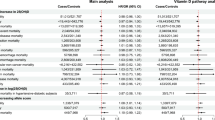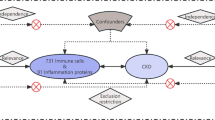Abstract
Summary
The study assessed contribution of genetic factors to variability of osteopontin (OPN) levels. Evidence of association of OPN levels with polymorphisms in its structural gene and integrin-binding sialoprotein gene loci was obtained. The results motivate research of OPN-related proteins and genes with respect to biomineralization and other biological processes.
Introduction
OPN is a major phosphoprotein in bone, which plays key role in regulation of bone mineralization process. It is considered as a promising biomarker for osteoarthritis and osteoporosis, and various other pathological conditions. However, the contribution of genetics and other confounding factors to OPN circulating levels variation in general population has never been specifically determined. The main aims of the present study included (1) evaluation of the putative genetic and familial factors’ effect on OPN variability and (2) testing the hypothesis that OPN plasma levels are associated with the genetic polymorphisms in its structural gene locus (SPP1) and in integrin-binding sialoprotein gene locus (IBSP).
Methods
To address these questions, we used a family-based sample of 925 apparently healthy Caucasian individuals. Association of OPN levels with three SNPs in each of the two selected gene loci was explored using pedigree disequilibrium tests.
Results
Some 58% and 13% of the OPN levels variability were attributable to genetic factors and common spouse environment, respectively. Three SNPs showed nominally significant association with OPN (p < 0.05). Of these, rs2616262 linked to IBSP promoter region remained significant after correction for multiple testing (p = 0.003). Significant association of this SNP and rs10516799 (distal segment of SPP1) with OPN was confirmed in several statistical tests. Using a special modification of variance component analysis, we examined gene–gene and gene–sex interaction effects, but found non-significant confirmation for these hypotheses.
Conclusions
Further studies are required to confirm the observed results and to explore the underlying molecular and physiological mechanisms.


Similar content being viewed by others
References
Arden N, Nevitt MC (2006) Osteoarthritis: epidemiology. Best Pract Res Clin Rheumatol 20:3–25
Cole ZA, Dennison EM, Cooper C (2008) Osteoporosis epidemiology update. Curr Rheumatol Rep 10:92–96
Harmey D, Hessle L, Narisawa S, Johnson KA, Terkeltaub R, Millán JL (2004) Concerted regulation of inorganic pyrophosphate and osteopontin by akp2, enpp 1, and ank: an integrated model of the pathogenesis of mineralization disorders. Am J Pathol 164:1199–1209
Clarke B (2008) Normal bone anatomy and physiology. Clin J Am Soc Nephrol 3:S131–S139
Rangaswami H, Bulbule A, Kundu GC (2006) Osteopontin: role in cell signaling and cancer progression. Trends Cell Biol 16:79–87
Buback F, Renkl AC, Schulz G, Weiss JM (2009) Osteopontin and the skin: multiple emerging roles in cutaneous biology and pathology. Exp Dermatol 18:750–759
Franzén A, Hultenby K, Reinholt FP, Onnerfjord P, Heinegård D (2008) Altered osteoclast development and function in osteopontin deficient mice. J Orthop Res 26:721–728
Chang IC, Chiang TI, Yeh KT, Lee H, Cheng YW (2010) Increased serum osteopontin is a risk factor for osteoporosis in menopausal women. Osteoporos Int 21:1401–1409
Honsawek S, Tanavalee A, Sakdinakiattikoon M, Chayanupatkul M, Yuktanandana P (2009) Correlation of plasma and synovial fluid osteopontin with disease severity in knee osteoarthritis. Clin Biochem 42:808–812
Matsui Y, Iwasaki N, Kon S, Takahashi D, Morimoto J, Matsui Y, Denhardt DT, Rittling S, Minami A, Uede T (2009) Accelerated development of aging-associated and instability-induced osteoarthritis in osteopontin-deficient mice. Arthritis Rheum 60:2362–2371
Gao SG, Li KH, Zeng KB, Tu M, Xu M, Lei GH (2010) Elevated osteopontin level of synovial fluid and articular cartilage is associated with disease severity in knee osteoarthritis patients. Osteoarthr Cartil 18:82–87
Sennels H, Sørensen S, Ostergaard M, Knudsen L, Hansen M, Skjødt H, Peters N, Colic A, Grau K, Jacobsen S (2008) Circulating levels of osteopontin, osteoprotegerin, total soluble receptor activator of nuclear factor-kappa B ligand, and high-sensitivity C-reactive protein in patients with active rheumatoid arthritis randomized to etanercept alone or in combination with methotrexate. Scand J Rheumatol 37:241–247
Wang KX, Denhardt DT (2008) Osteopontin: role in immune regulation and stress responses. Cytokine Growth Factor Rev 19:333–345
Lund SA, Giachelli CM, Scatena M (2009) The role of osteopontin in inflammatory processes. J Cell Commun Signal 3:311–322
Cho HJ, Cho HJ, Kim HS (2009) Osteopontin: a multifunctional protein at the crossroads of inflammation, atherosclerosis, and vascular calcification. Curr Atheroscler Rep 11:206–213
Johnson K, Goding J, Van Etten D, Sali A, Hu SI, Farley D, Krug H, Hessle L, Millán JL, Terkeltaub R (2003) Linked deficiencies in extracellular PP(i) and osteopontin mediate pathologic calcification associated with defective PC-1 and ANK expression. J Bone Miner Res 18:994–1004
Rosenthal AK, Gohr CM, Uzuki M, Masuda I (2007) Osteopontin promotes pathologic mineralization in articular cartilage. Matrix Biol 26:96–105
Willing MC, Torner JC, Burns TL, Janz KF, Marshall T, Gilmore J, Deschenes SP, Warren JJ, Levy SM (2003) Gene polymorphisms, bone mineral density and bone mineral content in young children: the Iowa Bone Development Study. Osteoporos Int 14:650–658
Taylor BC, Schreiner PJ, Doherty TM, Fornage M, Carr JJ, Sidney S (2005) Matrix Gla protein and osteopontin genetic associations with coronary artery calcification and bone density: the CARDIA study. Hum Genet 116:525–528
Richards JB, Kavvoura FK, Rivadeneira F, Styrkársdóttir U, Estrada K, Halldórsson BV, Hsu YH, Zillikens MC, Wilson SG, Mullin BH, Amin N, Aulchenko YS, Cupples LA, Deloukas P, Demissie S, Hofman A, Kong A, Karasik D, van Meurs JB, Oostra BA, Pols HA, Sigurdsson G, Thorsteinsdottir U, Soranzo N, Williams FM, Zhou Y, Ralston SH, Thorleifsson G, van Duijn CM, Kiel DP, Stefansson K, Uitterlinden AG, Ioannidis JP, Spector TD, Genetic Factors for Osteoporosis Consortium (2009) Collaborative meta-analysis: associations of 150 candidate genes with osteoporosis and osteoporotic fracture. Ann Intern Med 151:528–537
D’Alfonso S, Barizzone N, Giordano M, Chiocchetti A, Magnani C, Castelli L, Indelicato M, Giacopelli F, Marchini M, Scorza R, Danieli MG, Cappelli M, Migliaresi S, Bigliardo B, Sabbadini MG, Baldissera E, Galeazzi M, Sebastiani GD, Minisola G, Ravazzolo R, Dianzani U, Momigliano-Richiardi P (2005) Two single-nucleotide polymorphisms in the 5′ and 3′ ends of the osteopontin gene contribute to susceptibility to systemic lupus erythematosus. Arthritis Rheum 52:539–547
Golledge J, Muller J, Shephard N, Clancy P, Smallwood L, Moran C, Dear AE, Palmer LJ, Norman PE (2007) Association between osteopontin and human abdominal aortic aneurysm. Arterioscler Thromb Vasc Biol 27:655–660
Kariuki SN, Moore JG, Kirou KA, Crow MK, Utset TO, Niewold TB (2009) Age- and gender-specific modulation of serum osteopontin and interferon-alpha by osteopontin genotype in systemic lupus erythematosus. Genes Immun 10:487–494
Biros E, Clancy P, Norman PE, Golledge J (2009) A genetic polymorphism in transforming growth factor beta receptor-2 is associated with serum osteopontin. Int J Immunogenet 36:241–244
Huq NL, Cross KJ, Ung M, Reynolds EC (2005) A review of protein structure and gene organisation for proteins associated with mineralised tissue and calcium phosphate stabilisation encoded on human chromosome 4. Arch Oral Biol 50:599–609
Malaval L, Aubin JE, Vico L (2009) Role of the small integrin-binding ligand N-linked glycoprotein (SIBLING), bone sialoprotein (BSP) in bone development and remodeling. Osteoporos Int 20:1077–1080
Bellahcène A, Castronovo V, Ogbureke KU, Fisher LW, Fedarko NS (2008) Small integrin-binding ligand N-linked glycoproteins (SIBLINGs): multifunctional proteins in cancer. Nat Rev Cancer 8:212–226
Livshits G, Karasik D, Kobyliansky E (2002) Complex segregation analysis of the radiographic phalanges bone mineral density and their age-related changes. J Bone Miner Res 17:152–161
Kalichman L, Malkin I, Livshits G, Kobyliansky E (2006) Age at menarche in a Chuvashian rural population. Ann Hum Biol 33:390–397
International HapMap Consortium (2003) The International HapMap Project. Nature 426:789–796
Rhead B, Karolchik D, Kuhn RM, Hinrichs AS, Zweig AS, Fujita P, Diekhans M, Smith KE, Rosenbloom KR, Raney BJ, Pohl A, Pheasant M, Meyer L, Hsu F, Hillman-Jackson J, Harte RA, Giardine B, Dreszer T, Clawson H, Barber GP, Haussler D, Kent WJ (2010) The UCSC Genome Browser database: update 2010. Nucleic Acids Res 38:D613–D619
Barrett JC, Fry B, Maller J, Daly MJ (2005) Haploview: analysis and visualization of LD and haplotype maps. Bioinformatics 21:263–265
Malkin I, Ginsburg E (2009) Program package for Mendelian analysis of pedigree data (MAN, Version 9). Department of Anatomy and Anthropology, Sackler Faculty of Medicine, Tel Aviv University; Technical Report
Falconer DS, Mackay TFC (1996) Introduction to quantitative genetics, 4th edn. Longman, London
Suk EK, Malkin I, Dahm S, Kalichman RN, Kobyliansky E, Toliat M, Rutsch F, Nürnberg P, Livshits G (2005) Association of ENPP1 gene polymorphisms with hand osteoarthritis in a Chuvasha population. Arthritis Res Ther 7:R1082–R1090
Korostishevsky M, Cohen Z, Malkin I, Ermakov S, Yarenchuk O, Livshits G (2010) Morphological and biochemical features of obesity are associated with mineralization genes’ polymorphisms. Int J Obes (Lond) 34(8):1308–1318
D’Amore M, Fanelli M, D’Amore S, Fontana A, Minenna G (2006) Receptor activator of NF(Kappa)B ligand/osteoprotegerin (RANKL/OPG) system and osteopontin (OPN) serum levels in a population of apulian postmenopausal women. Panminerva Med 48:215–221
de las Fuentes L, Gu CC, Mathews SJ, Reagan JL, Ruthmann NP, Waggoner AD, Lai CF, Towler DA, Dávila-Román VG (2008) Osteopontin promoter polymorphism is associated with increased carotid intima-media thickness. J Am Soc Echocardiogr 21:954–960
Liu CC, Huang SP, Tsai LY, Wu WJ, Juo SH, Chou YH, Huang CH, Wu MT (2010) The impact of osteopontin promoter polymorphisms on the risk of calcium urolithiasis. Clin Chim Acta 411:739–743
Han S, Guthridge JM, Harley IT, Sestak AL, Kim-Howard X, Kaufman KM, Namjou B, Deshmukh H, Bruner G, Espinoza LR, Gilkeson GS, Harley JB, James JA, Nath SK (2008) Osteopontin and systemic lupus erythematosus association: a probable gene-gender interaction. PLoS ONE 3:e0001757
Chiocchetti A, Orilieri E, Cappellano G, Barizzone N, D Alfonso S, D Annunzio G, Lorini R, Ravazzolo R, Cadario F, Martinetti M, Calcaterra V, Cerutti F, Bruno G, Larizza D, Dianzani U (2010) The osteopontin gene +1239A/C single nucleotide polymorphism is associated with type 1 diabetes mellitus in the Italian population. Int J Immunopathol Pharmacol 23:263–269
Chang YS, Kim HJ, Chang J, Ahn CM, Kim SK, Kim SK (2007) Elevated circulating level of osteopontin is associated with advanced disease state of non-small cell lung cancer. Lung Cancer 57:373–380
Lettre G (2009) Genetic regulation of adult stature. Curr Opin Pediatr 21:515–522
Zhang J, Tu Q, Chen J (2009) Applications of transgenics in studies of bone sialoprotein. J Cell Physiol 220:30–34
Styrkarsdottir U, Halldorsson BV, Gretarsdottir S, Gudbjartsson DF, Walters GB, Ingvarsson T, Jonsdottir T, Saemundsdottir J, Snorradóttir S, Center JR, Nguyen TV, Alexandersen P, Gulcher JR, Eisman JA, Christiansen C, Sigurdsson G, Kong A, Thorsteinsdottir U, Stefansson K (2009) New sequence variants associated with bone mineral density. Nat Genet 41:15–17
Koller DL, Ichikawa S, Lai D, Padgett LR, Doheny KF, Pugh E, Paschall J, Hui SL, Edenberg HJ, Xuei X, Peacock M, Econs MJ, Foroud T (2010) Genome-wide association study of bone mineral density in premenopausal European-American women and replication in African-American women. J Clin Endocrinol Metab 95:1802–1809
Rivadeneira F, Styrkársdottir U, Estrada K, Halldórsson BV, Hsu YH, Richards JB, Zillikens MC, Kavvoura FK, Amin N, Aulchenko YS, Cupples LA, Deloukas P, Demissie S, Grundberg E, Hofman A, Kong A, Karasik D, van Meurs JB, Oostra B, Pastinen T, Pols HA, Sigurdsson G, Soranzo N, Thorleifsson G, Thorsteinsdottir U, Williams FM, Wilson SG, Zhou Y, Ralston SH, van Duijn CM, Spector T, Kiel DP, Stefansson K, Ioannidis JP, Uitterlinden AG, Genetic Factors for Osteoporosis (GEFOS) Consortium (2009) Twenty bone-mineral-density loci identified by large-scale meta-analysis of genome-wide association studies. Nat Genet 41:1199–1206
Acknowledgements
This study was funded by Israel Ministry of Health, Chief Scientist grant #3-4101.
Conflicts of Interest
None.
Author information
Authors and Affiliations
Corresponding author
Rights and permissions
About this article
Cite this article
Ermakov, S., Leonov, A., Trofimov, S. et al. Quantitative genetic study of the circulating osteopontin in community-selected families. Osteoporos Int 22, 2261–2271 (2011). https://doi.org/10.1007/s00198-010-1451-7
Received:
Accepted:
Published:
Issue Date:
DOI: https://doi.org/10.1007/s00198-010-1451-7




